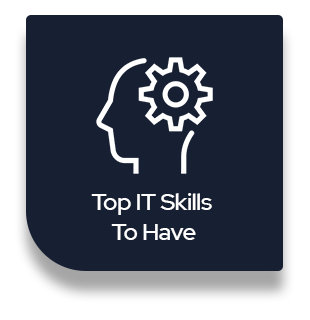Top IT Skills to Have in 2022: IT professionals are among the sought-after members of the labor market, as a growing skills shortage drives demand for highly specialized workers. Yet, despite an increase in technology graduates and greater workforce mobility as experienced professionals switch jobs more frequently, many businesses still struggle to fill job vacancies.
Part of this problem is attributed to the rapid evolution in the IT industry, fueled by transitions to the cloud and the adoption of AI and other workplace automation. Unfortunately, many IT professionals have struggled to keep pace with the latest technology developments, which can limit career opportunities and progression. If this sounds familiar, we’ve compiled a list of the top IT skills you need to focus on to secure your next promotion.
The IT Skills Gap Continues to Widen
If you’re considering upskilling, here are a few eye-opening stats on the current state of the global IT skills gap:
- The US Bureau of Labor Statistics projects IT jobs will increase by 13% from 2020 to 2030
- By 2030, the skills gap and talent shortage in the US alone is projected to cause a loss amounting to $8.5 trillion.
- 58% of employers find getting employees with the right skill set challenging.
- 62% of HR directors and 82% of employees believe that workers will need to upskill or reskill at least once yearly to maintain a competitive edge.
While the IT skills shortage undeniably has a negative impact on employers and employees, it also presents an opportunity. If employees can acquire the necessary IT skills to address this gap, they are guaranteed career progression as they power their employer’s business innovation and growth.
Top IT Skills to Have in 2022
Want to prepare for your next promotion? These are the essential IT skills that you should add to your resume:
Cybersecurity
The cyber threat landscape continues to expand as new technologies emerge. Today, organizations of all sizes risk falling victim to catastrophic cyber attacks. A cybersecurity breach can result in substantial financial losses and tarnish an organization’s reputation. Unsurprisingly, many organizations invest heavily in cybersecurity, with cybersecurity experts in high demand.
Cybersecurity roles involve safeguarding sensitive information and critical resources from threat actors.
Some IT skills required to become a cybersecurity expert include data encryption, computer forensics, penetration testing, and threat analysis.
Some of the top-paying cybersecurity roles include information security manager ($150,000-$225,000), cybersecurity engineer ($120,000-$210,000), and network security engineer ($125,000-$185,000).
Cloud Management/Cloud Computing
Cloud management entails delivering computing services such as storage, software, servers, and databases via the cloud. Organizations are increasingly adopting cloud computing because it lowers operational costs and allows them to scale their IT infrastructure as needed.
According to research, the cloud computing market will hit the $947.3 billion mark by 2026. As a result, the demand for cloud management talent will continue to increase in the coming years.
Jobs you can land by improving your IT skills in cloud computing include cloud architect, cloud engineer, UI designer, and cloud system administrator. On average, cloud computing experts’ earnings range between $70,000 and $250,000 yearly.
System Administration
System administrators (or SysAdmins) play a vital role in keeping a company’s computer network in good working order. Day-to-day tasks include:
- Monitoring system security.
- Rolling out patches and upgrades.
- Performing backups.
- Managing employee user accounts across various company apps.
System administrators also support HR & People Teams with critical employee onboarding tasks. The automation of device provisioning and new hire setup is a valuable skill for SySAdmins to have, particularly in fast-growing companies that recruit on a large scale.
To become a system administrator, it’s an excellent idea to upskill in areas like network management, plus knowledge of hardware and various operating systems. In the US, system administrators earn an average salary of $76,000.
Blockchain
Blockchain is a shared, unchangeable ledger that records transactions and keeps track of assets in an organizational network. Assets can be tangible, like capital and vehicles, or intangible, such as copyrights and patents.
While still in its infancy, blockchain is one of the fastest-growing technology fields, making it one of the top IT skills companies will need in the coming years. As a result, the global blockchain market is projected to reach $137.59 billion by 2030.
If you are interested in becoming a blockchain expert, you should focus on IT skills like cryptography, smart contracts, cybersecurity, and programming. Blockchain roles include blockchain solution expert, blockchain UX designer, and blockchain developer, with workers in this field commanding salaries of $110,000-$200,000.
Augmented Reality (AR) and Virtual Reality (VR)
Augmented reality (AR) is an interactive experience characterized by objects that live outside the physical world and are enhanced using computer-generated data. Virtual reality (VR) refers to simulated experiences that can be the same or entirely different from the real world. In short, VR replaces real-world reality with a computer-generated environment, while AR overlays digital information in the real world.
Organizations are increasingly adopting AR/VR technologies for various purposes, and the uptake is growing in industries such as e-commerce, gaming, entertainment, and real estate. According to research, the AR and VR market size was $14.84 billion in 2020 and is expected to grow to $454.73 billion by 2030.
This growth opens up opportunities for IT professionals to venture into a new field. For example, AR/VR roles, such as 3D artists, design architects, and software engineers, earn an average annual salary of $81,000 in the US.
Software Development
Software development entails the creation of computer applications and systems to run devices or control networks. Unlike other IT skills, software development has been in demand for a long time, and employers show no signs of slowing recruitment in this area.
Today, organizations need software developers to build feature-rich, innovative applications and products that provide satisfactory customer experiences. If you already work in another IT field and want to upskill, this can be one of the more accessible career transitions available to you.
To venture into software development, you should learn programming languages such as C++, Java, Javascript, and Python, which can make you eligible for roles like web developer, software engineer, and computer programmer. On average, software development jobs earn around $131,000 in the US.
Struggling With the IT Skills Gap?
Technological advancements are taking place at a rapid rate. As a result, IT professionals must upskill or reskill regularly to remain competitive and progress in their careers. Equally, businesses must empower their IT workforce to perform as efficiently as possible. One proven approach to streamlining IT operations is leveraging managed IT skills with Skilldacity.



